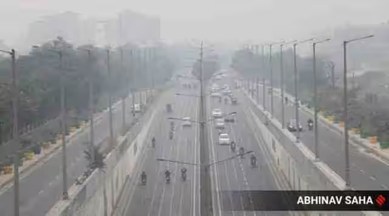Stay updated with the latest - Click here to follow us on Instagram
Delhi’s air quality dips to poor, GRAP stage 1 kicks in
Going by a forecast issued by the Air Quality Early Warning System for Delhi on Friday, the AQI is likely to be in the ‘poor’ category till Sunday, and then in the ‘moderate’ category on Monday.

Water sprinkling, diversion of truck traffic not destined for Delhi through the eastern and western peripheral expressways, ban on coal/firewood in tandoors in hotels and open eateries: With the air quality deteriorating to the ‘poor’ category in the Capital on Friday, pollution-control measures under stage I of the Graded Response Action Plan (GRAP) have been imposed across Delhi-NCR.
The AQI on Friday was 212, having deteriorated from 177 on Thursday. AQI between 201 and 300 is considered to be ‘poor’, and can cause breathing discomfort to most people on prolonged exposure, according to the Central Pollution Control Board (CPCB). The AQI in Noida, Greater Noida, Gurgaon, Ghaziabad, Faridabad and Meerut, was also in the ‘poor’ category on Friday.
monthly limit of free stories.
with an Express account.
Going by a forecast issued by the Air Quality Early Warning System for Delhi on Friday, the AQI is likely to be in the ‘poor’ category till Sunday, and then in the ‘moderate’ category on Monday. It is likely to remain in the ‘moderate’ to ‘poor’ category over the subsequent six days, going by the forecast.
The order issued by the Commission for Air Quality Management (CAQM), imposing the first stage of GRAP, pointed to “unfavourable meteorological conditions” as the reason for the dip in air quality. A combination of low wind speed and cold temperatures keeps pollutants trapped close to the surface of the earth in winter.
Gufran Beig, founder project director, SAFAR, and chair professor, National Institute of Advanced Studies, said that calm conditions setting in, along with the start of lower temperatures after monsoon withdrawal, could be factors for Delhi’s ‘poor’ air quality on Friday.
The Air Quality Early Warning System said that on Saturday, the city is likely to see a wind speed of 6 to 12 kmph; an average wind speed of less than 10 kmph can be unfavourable for the dispersion of pollutants. Over the past four days, Delhi has recorded a minimum temperature of less than 20 degrees Celsius – the figure stood at 18.6 degrees early on Friday, according to the India Meteorological Department (IMD).
On Friday, Punjab recorded 91 crop residue burning events, going by IARI data, taking the total for the state to 845 from September 15 to October 6. Beig added that these figures were not significant enough to have an impact on Delhi yet. Haryana, meanwhile, has recorded 209 crop residue-burning events over the same period.
Other steps that are to be implemented as part of Stage I of GRAP include dust-control measures like periodic mechanised sweeping and water sprinkling, dust-mitigation measures at construction and demolition sites, and use of anti-smog guns, ensuring pollution-control regulations in industries and emission norms in thermal power plants.
Restrictions under stages II, III and IV of GRAP are to be invoked three days ahead of the AQI hitting the ‘very poor’, ‘severe’, and ‘severe plus’ categories respectively.